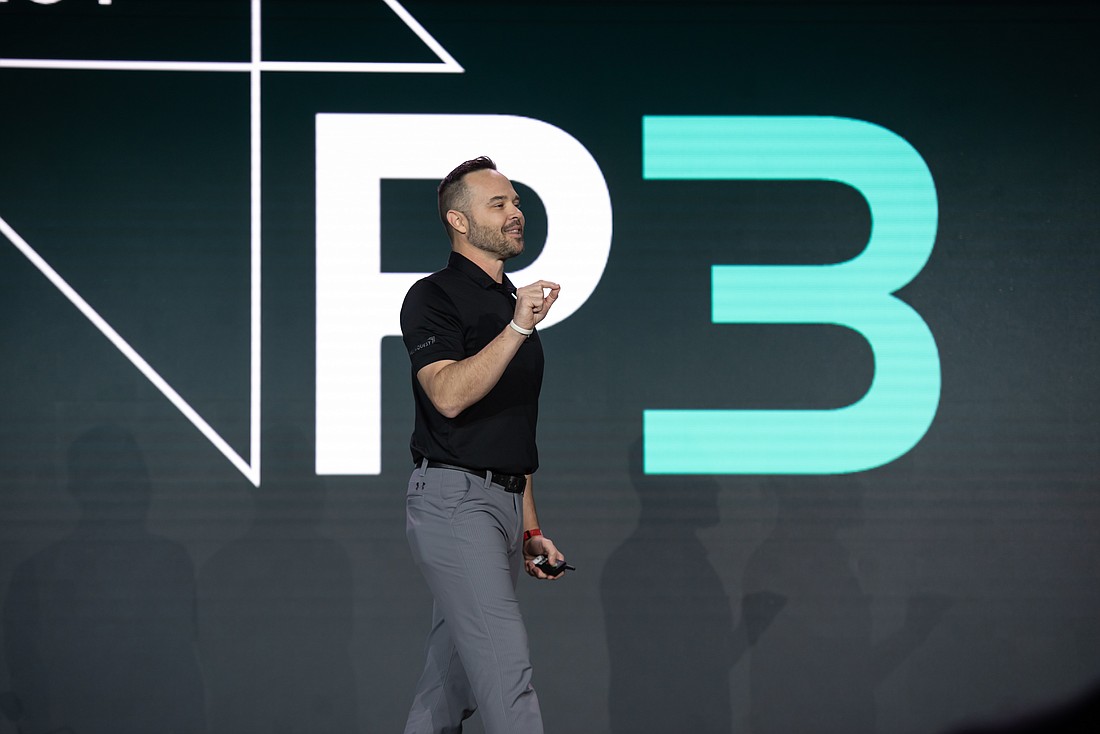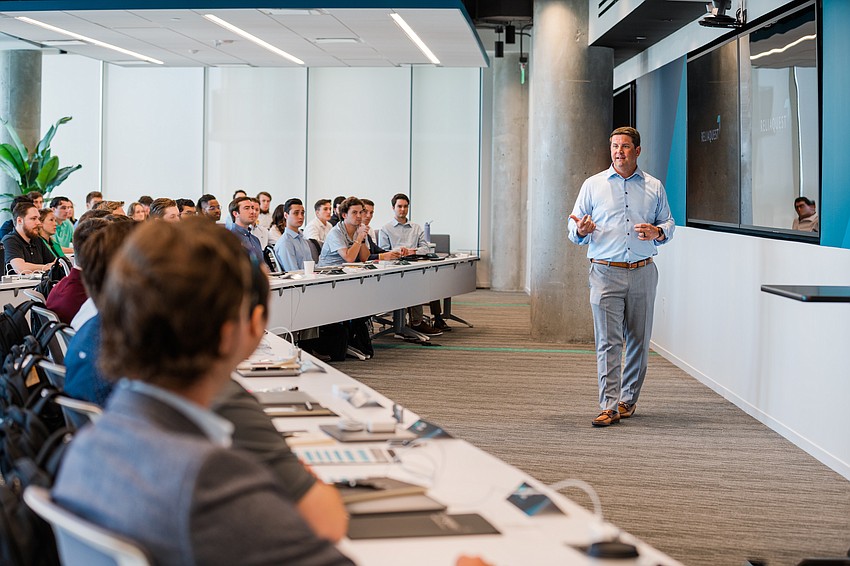- March 13, 2025
-
-
Loading

Loading

Derin McMains recently kicked off a top executive level meeting at Tampa-based cybersecurity pioneer ReliaQuest, with a tale that, on the surface, seems ill-placed for a billion-dollar global tech firm. The story’s focus: wilderness survival.
A former pro baseball player and coach, McMains, now director of mental performance at ReliaQuest, didn't tell a personal staying alive story. Instead, in what the company calls a Mindset Moment, McMains’ story was from the book “Deep Survival: Who Lives, Who Dies and Why.”
Nearly every meeting at any level at ReliaQuest, which has some 1,000 employees across six worldwide offices, including 500 or so in Tampa, starts with a Mindset Moment. A ReliaQuest Mindset Moment is about five to seven minutes. The idea is to inspire or motivate meeting participants, while relating it to a high-level principle and company core value. The idea follows something ReliaQuest founder and CEO Brian Murphy often says, that the company doesn't have a culture but a mindset.
“Culture doesn’t live or breathe,” Murphy says. “I want a mindset. We want everyone here to have clarity to make decisions. We want people, when they sit down at a keyboard, they know what problem they are solving for and why it matters.”
And that led to the Mindset Moment. “People go from meeting to meeting and we want them to be present,” McMains says. “We want it to be intentional.”
McMains says the premise of “Deep Survival,” a 2003 book by Laurence Gonzales, was on his mind in June following the news that four children — including a baby — survived a plane crash and then 40 days in the Amazon Rainforest before being rescued. Two decades prior to that, “Deep Survival,” billed as the first book to describe the art and science of survival, asked readers: What age group is best equipped to survive being lost in the woods or jungle?
It’s not adults with age-based wisdom. Or young adults with naive bravery. The author claims, just like the Amazon survivors, the best survivors are kids ages two to six.
“Wait, what?” a stunned McMains wondered when he first read that.
Then he read on.
“It’s because at that age they have the power of acceptance,” McMains says. “They just accept where they are. If they’re cold, they try to get warm. If they’re scared, they say, “I’ll go crawl into a tree trunk.’”
Known to just about everyone in ReliaQuest as DMac — that’s how he signs his emails, too — McMains turned that story into a teachable moment for the Reliaquest executives for the Mindset Moment. “You can't get caught up in what just happened, or I can’t believe he did this or she did that,” he says. “You have to say ‘OK, this is what happened, now let’s move forward.’”
McMains even being at ReliaQuest to help the company move forward is a testament to Murphy and his senior leadership team. Murphy began to place an emphasis on mental health conditioning nearly a decade ago, after he read an article in ESPN magazine about renowned mental performance coach Trevor Moawad and his work with University of Alabama football coach Nick Saban. Before working with Saban, NFL star quarterback Russell Wilson and others, Moawad ran the IMG Performance Institute at IMG Academy in Bradenton, from 2000 to 2012. He also wrote “It Takes What It Takes: How to Think Neutrally and Gain Control of Your Life,” a best-selling book.
“If a high-performing sports organization could use mental performance to help bring clarity to make the right decision, then why not a company?” Murphy wondered at the time.
A Florida State alum, Murphy reached out to a Seminole booster club, as Moawad had also worked with FSU football coach Jimbo Fisher.
ReliaQuest had about 60 employees then and one office, but Murphy knew conquering the market would require — to use a sports metaphor — both speed and agility. In their first meeting Moawad, recalls Murphy, talked a lot about the difference between being good and great and how mindset is a leading marker to get to the latter.
Moawad, who died of cancer at 48 in 2021, worked on a consulting basis with the company for several years. Moawad also introduced McMains to Murphy. McMains actually spoke at a ReliaQuest conference in Arizona when Moawad couldn’t make it.
Murphy was in the audience. He approached McMains after the presentation about working for ReliaQuest. “I asked Murph, ‘What would it look like?' He said, 'I don’t know, but let's find out together.’”

McMains, who says he’s a “curious person in general and I love challenges,” joined the company full-time in January 2021. He now works alongside mental performance coach Nicole Detling, a Ph.D in the field who joined the company in July 2022.
“Dmac’s a critical part of what we do, how we grow and how we make decisions,” Murphy says.
Mental health in the workplace, to some extent, has begun to turn from taboo to timely, as more companies devote resources, in money and people, to it. But having two full-time, non-revenue generating employees at high levels of the company devoted to mental health, like ReliaQuest does, is a unicorn-like rarity.
And that’s not lost on Murphy, who adds that the quest to maintain the right mindset is an everyday thing at ReliaQuest. “This isn’t a fad. This isn’t a painting on the wall,” he says. “We use mental performance to teach values-based decision making.”
ReliaQuest Director of Mental Performance Derin McMains says some of the best outcomes of the work he does for the company come in unexpected places.
McMains illustrates that with a story about how he recently spoke to a high-level ReliaQuest official having trouble focusing at work because the executive’s son was being bullied at school. McMains told the official about the E+R=O mindset: event plus response equals outcome. “If you want a better outcome in the end,” McMains says, “ you have to choose a better response.”
McMains meant it to help the executive. But the executive told his son about the theory. And the son took to it. Things got better at school, and then the executive got better at work, and was able to focus more. Says McMains: “That’s how you know this really works.”
McMains was doing mindset moments and prioritizing mental health for several years before the pandemic and its crisis of loneliness drew more attention to the problem. “Mental performance,” he says, “is a check up from neck up.”
McMains, 43, adds that a focus on mental health and mental performance, now and in the future, is similar to the 1970s, when people were sedentary and stuck in chairs all day at work. That, he says, kicked “off the revolution and personal training and gyms.”
“This is the same thing,” he adds. “It’s preparing people to do better.”
McMains’ ‘do better’ was going to be, at first, in pro baseball. He played in the San Francisco Giants minor league system for six years, from 2001 to 2008. He played in 340 games, according to Minor League Baseball official statistics, and rose as high as Double A — two call ups short of the Majors. Part of that was from an injury, says McMains, which is when he “really learned the value of mindset, and how we could impact people’s performance.”
McMains turned that mindset into a career. He took on mental health performance roles for the Giants, and later the Seattle Mariners and Arizona Diamondbacks. With the Giants he helped the team win three World Series titles. He remains a consultant with the Diamondbacks, along with his work at ReliaQuest. Along the way McMains was a director of mental conditioning for the major leagues of college sports, at Notre Dame, where he worked one-on-one with 26 coaches at the school.
While the Mindset Moments are important, and a key part of what McMains helps facilitate art ReliaQuest, they remain mere moments.
McMains says his job, overall, is to work with managers and executives to help them build better teams, maintain and grow an edge and overcome a variety of setbacks and issues. “People don’t get burned out from the work they do but they get burned out because they forget why they do it,” he says. “I remind them why they do it.”
Tampa cybersecurity company ReliaQuest has around 800 customers across the world. The company says it aims to be known as a firm that “makes security possible” for enterprise brands — opposed to being a reactive entity in what’s become a highly-competitive field over the past decade. It does that through its security operations platform, GreyMatter, which automates detection, investigation and response across a variety of systems.
Entrepreneur Brian Murphy founded the company in 2007 in Tampa. It’s grown from 60 to 1,000 employees; has picked up hundreds of millions in investment capital; and moved into several new offices. It recently opened its new global headquarters in Tampa’s Water Street district, becoming the first corporate anchor tenant there, with 142,000 square feet at 1001 Water Street. It also has offices in Las Vegas; Salt Lake City; London; Dublin; and Pune, India